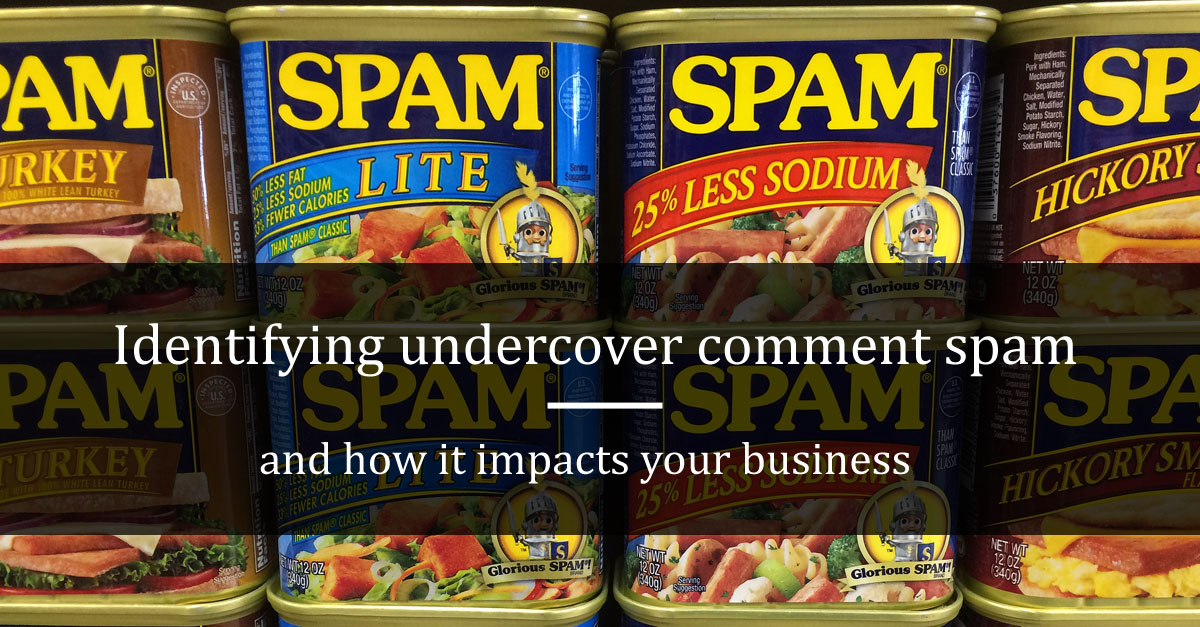
The average website that allows user interaction will receive between 10 and 200 spam comments per day. No, that’s not a typo: 10 to 200 spam comments per day. There’s plenty that can be done to automate the process of identifying and blocking spam, and if you’re hosting with us, we’ve put a number of those processes into place already. But spammers are wily, and are constantly inventing new ways to get around spam filters, and a few spam comments may slip through every week.
Why Managing Spam Matters
It’s crucial that you properly mark spam comments as spam, because…
- Having bad links (links Google knows to be associated with spammers) on your website can impact your SEO score, and cause your website to fall down the search rankings, reducing the number of visitors who find your site and potentially increasing your Google Adwords advertising costs.
- Spammy comments leave a bad impression on your site visitors. It makes them feel that you are unprofessional, inattentive, or not detail oriented, which will make other interactions with them more difficult (such as closing sales!)
- More than just leaving a bad impression on your site visitors, it can put them in danger of being scammed if they follow one of those links!
But spammers aren’t just getting tricksy about getting around spam filters – many are also working hard to trick site moderators into approving their comments! Here’s a quick guide to identifying a comment as spam.
Red Flags to Watch for in Comment Messages
- Link or keyword heavy: If the comment is packed with links or keywords, such as brand names, it’s spam. This is the easiest form of spam to spot, and the one most often caught by automatic filters on your behalf.
- Wrong language: If the comment is written in a language that you do not understand and is not offered on your website (as a translation option), such as Russian or Chinese, it is likely spam. Even if it isn’t, you should probably not approve comments that you aren’t able to understand, in case it contains something rude.
- Compliments: If the comments contains a generic compliment, be suspicious! Many spammers now leave comments such as “So glad I found this blog, you know your stuff. I am going to bookmark this site!” in the hopes that you will approve the comment without checking to see what they put in the website or name fields. If the compliment would make just as much (or as little) sense on any other post in the world, it’s likely it was left by a robot that just wants to get its links onto your site.
Offering services: One of the most common forms of spam is offers to get you to the #1 spot on Google, or otherwise improve your search rankings. This often comes combined with a compliment, ie “You have great content here, I bet you could be #1 on Google! I can help you get all the traffic you deserve.” Keep in mind that even top ranked websites receive this exact same spam: It doesn’t necessarily indiciate anything about the quality of your current SEO. - No details error report: Another common tactic is to try to alarm you by telling you there is something wrong with your website, and disarm you by seeming to be helpful. However, if the report mentions “errors” but is vague about what those errors are, and especially if it is combined with an offer of services, it is highly likely that it is spam. An example is: “I noticed you have errors on your page which could impact your Google ranking.”
- Political or pop culture rants: In an effort to seem more “human,” many spam bots are trained to blurt generic, sometimes nonsensical, commentary on politics or pop culture. If you see a comment like this on a post that has nothing to do with that topic, it may well be spam. Even if it isn’t “spam,” it IS off topic and should not be approved.
Beyond the Comment: Author Name and Author Link
Check the contact information of the person who submitted it, especially the “website” field.
If you wouldn’t want someone to click the link the comment author has provided as their “home base,” because it seems spammy or offensive, then that comment may be a trojan horse to try and get a bad link onto your site. Also, if the commentor is using keywords in place of their name (“cheap gold”, “knockoff gucci,” “viagra“), it is likely spam.
Good luck in your quest to protect your business from sneaky spam!







Leave A Comment